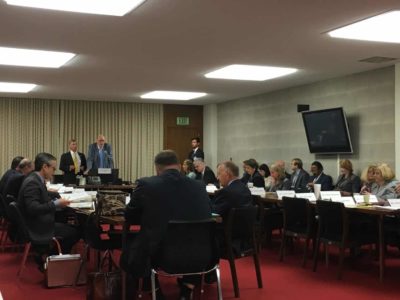The House and Senate passed legislation on controversial topics yesterday. None more so than House Bill 13, whose approval by the Senate put to rest perhaps the most high-profile education legislation of the session.
The version of House Bill 13 that passed the Senate yesterday differs from the widely-supported version passed by the House, however.
“House Bill 13 is a proposed compromise solution that preserves our long-standing goal of reducing kindergarten, first, second, and third grade class sizes while addressing local schools’ concerns about any unintended potential consequences of implementation,” said Sen. Chad Barefoot, R-Wake, when presenting the bill to the Senate.
House Bill 13 would originally have allowed the average class size in grades K-3 to exceed restrictions passed in the 2016 budget by three students, and the maximum individual class size to exceed these numbers by six students.
The compromise version that passed the Senate, however, instead put a one year delay on the implementation of the class size restrictions.
Those restrictions mandate that the class size allotment ratio and the maximum districtwide average class size be the same. They go into effect in the 2018-19 school year and are as follows:
– Kindergarten: 1:18
– First grade: 1:16
– Second grade: 1:17
– Third grade: 1:17
Under the legislation passed yesterday, the rules for next year — the last school year before the restrictions go into effect— are that the K-3 average class size cannot exceed 20 students, and the maximum individual class size cannot exceed 23 students.
The revised bill also requires biannual reports from school districts that include information on teacher funding, class sizes, and program enhancement teachers, along with any other information requested by the Superintendent of Public Instruction.
The superintendent is required, under the amended bill, to conduct periodic audits of the reports. If any noncompliance is found, the State Board of Education could withhold the local superintendent’s salary.
Opponents of the class size restrictions argue that they eliminate flexibility needed to fund extracurricular teachers for subjects like art, physical education, and music. Without that flexibility, many districts have said they may have to lay off teachers or teacher assistants.
Barefoot said in committees where the bill was taken up that the legislature will ultimately provide funding, probably in a separate line item, for enhancement teachers after the class size restrictions go into place. However, the revised version of HB 13 does not specify separate funding.
Sen. Jay Chaudhuri, D-Wake, tried to pass an amendment that would state the General Assembly’s intention to provide that funding, but it was not heard or voted on.
Sen. Mike Woodard, D-Durham, said that was a mistake.
“It’s disappointing to me we wouldn’t even take a vote on the very simple statement,” he said.
Both Chaudhuri and Woodard called the revised version of HB 13 a temporary fix, with Woodard comparing it to the Bill Murray movie “Groundhog Day.”
“I fear without the commitment in the bill tonight that Sen. Chaudhuri proposed …we’re going to be reliving Groundhog Day next year with these teachers,” he said.
In support of the bill’s lack of explicit guidance on funding enhancement teachers, Sen. Jerry Tillman, R-Randolph, said it was impossible to speculate how much funding would be needed because school districts are not providing the data.
“We cannot determine what it will cost to put enhancement teachers back in the classrooms until we get that exact number from every school system in the state,” he said.
A survey from the General Assembly was sent to districts around the state asking for numbers on how the schools spend state money, but some in the Senate have argued that the answers that came back were insufficient.
“It’s not a real simple problem until you get the exact figures,” Tillman said.
However, in a letter to senators, the N.C. Association of School Administrators which distributed the surveys, said that “School districts have been responsive, cooperative and transparent in providing the requested information.”
See our explainer of the class size restriction issue here.
House Bill 13 returns to the House for a concurrence vote.
The Senate also passed Senate Bill 15 yesterday, which would grant extra classroom teachers to geographically isolated schools.
The K-12 schools have a small number of students in their classes but, because of where they are located, cannot be merged with other schools to provide more appropriate class sizes.
Right now, the state has three schools that would be affected: two in Macon County, and one on Ocracoke.
House
On the other side of the legislature, the full House passed House Bill 800 yesterday which allows corporations called “charter partners” to grant priority enrollment to their employees’ children.
To be a charter partner, a business must donate property or the school building or help the school with renovations or technological resources. No more than 50 percent of the student population would be given priority in the charter school’s lottery. However, if there are more applicants, the bill would require their acceptance in a separate lottery.
The provision reserving space for company students was too much for Rep. Graig Meyer, D-Orange.
“I don’t like this provision of the bill that opens up the opportunity for businesses to have a set aside,” he said before voting against the legislation.
Rep. Scott Stone, R- Mecklenburg, however, argued that there was no downside to the bill and that it would incentivize corporations to bring jobs to the state.
“It’s a win-win-win for everybody, and I don’t think anyone should be scared off by some of the rhetoric,” he said.
Rep. Amos Quick, D-Guilford, lambasted the bill before he was interrupted by another House member.
“We have in North Carolina teachers who need to be paid more, school infrastructure that is falling apart … students attending schools, again, that are too hot in the summer, too cold in the winter, teachers demanding to be paid and they have teacher assistants, and our response to that is to have corporations to receive—”
He was interrupted mid-sentence for not being on topic. When he was allowed to speak again, he simply said that the state already has schools with too many needs to be spending tax dollars on incentivizing corporations.
Rep. John Bradford, R-Mecklenburg, Deputy Majority Whip, said this bill would help overcome one of the largest hurdles facing some charter schools.
“The toughest part for a charter school is the up front capital to get started,” he said. “That’s really where this bill comes into play.”
The measure could potentially make businesses more likely to come to areas with low-quality schools, he said. He speculated that the opposition to the bill was because legislators were stuck in their ways.
“I realize this is something new and creative and sometimes with that comes a resistance to change,” he said.



